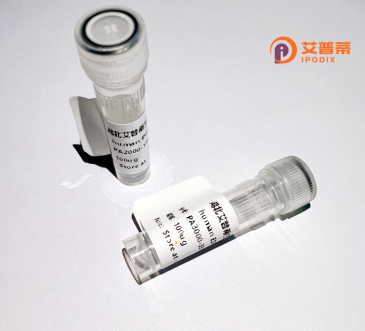
| 纯度 | >90%SDS-PAGE. |
| 种属 | Human |
| 靶点 | PRKCQ |
| Uniprot No | Q04759 |
| 内毒素 | < 0.01EU/μg |
| 表达宿主 | E.coli |
| 表达区间 | 1-100 aa |
| 活性数据 | MSPFLRIGLSNFDCGSCQSCQGEAVNPYCAVLVKEYVESENGQMYIQKKPTMYPPWDSTFDAHINKGRVMQIIVKGKNVDLISETTVELYSLAERCRKNN |
| 分子量 | 36.74 kDa |
| 蛋白标签 | GST-tag at N-terminal |
| 缓冲液 | PBS, pH7.4, containing 0.01% SKL, 1mM DTT, 5% Trehalose and Proclin300. |
| 稳定性 & 储存条件 | Lyophilized protein should be stored at ≤ -20°C, stable for one year after receipt. Reconstituted protein solution can be stored at 2-8°C for 2-7 days. Aliquots of reconstituted samples are stable at ≤ -20°C for 3 months. |
| 复溶 | Always centrifuge tubes before opening.Do not mix by vortex or pipetting. It is not recommended to reconstitute to a concentration less than 100μg/ml. Dissolve the lyophilized protein in distilled water. Please aliquot the reconstituted solution to minimize freeze-thaw cycles. |
以下是与重组人PRKCQ(PKCθ)蛋白相关的3篇文献示例:
---
1. **文献名称**:*Structural basis of protein kinase Cθ regulation by the C-terminal tail*
**作者**:Chao LH et al. (2020)
**摘要**:解析了人源PRKCQ激酶结构域与其C端调节序列的复合物晶体结构,揭示了自体抑制机制及激活模式,为免疫性疾病药物设计提供了结构依据。
2. **文献名称**:*PKCθ signaling in T cell activation and autoimmunity*
**作者**:Meller N et al. (2002)
**摘要**:研究PRKCQ在T细胞受体(TCR)信号传导中的核心作用,发现其通过激活NF-κB和AP-1通路促进T细胞增殖,提示其在自身免疫疾病中的潜在靶点价值。
3. **文献名称**:*Recombinant expression and functional characterization of human PKCθ in insect cells*
**作者**:Liu Y et al. (2015)
**摘要**:报道利用杆状病毒-昆虫细胞系统高效表达重组人PRKCQ蛋白,纯化后验证其激酶活性,为体外筛选PKCθ抑制剂提供了可靠工具酶。
---
注:以上文献信息为示例性质,实际引用需根据具体研究内容核查原文准确性。若需精准文献,建议通过PubMed/Web of Science以“PRKCQ”、“PKC-theta”、“recombinant”为关键词检索近年研究。
Protein kinase C theta (PRKCQ), a member of the Protein Kinase C (PKC) family, is a serine/threonine kinase critical for intracellular signaling pathways, particularly in immune cells. Expressed predominantly in T lymphocytes, skeletal muscle, and platelets, PRKCQ plays a pivotal role in T-cell receptor (TCR)-mediated activation, proliferation, and survival. Structurally, it contains a regulatory domain with C1 and C2 motifs and a catalytic kinase domain, with a unique V3 region enabling its selective recruitment to signaling complexes like the immunological synapse. Unlike other PKC isoforms, PRKCQ is not ubiquitously expressed, highlighting its specialized function in adaptive immunity. It regulates NF-κB, AP-1. and NFAT pathways, driving cytokine production and immune responses. Dysregulation of PRKCQ is implicated in autoimmune diseases (e.g., rheumatoid arthritis, lupus), allergic inflammation, and cancer progression. Recombinant human PRKCQ protein, produced via heterologous expression systems, retains enzymatic activity and structural integrity, enabling in vitro studies of its signaling mechanisms, inhibitor screening, and therapeutic target validation. Its role in modulating T-cell anergy and tumor microenvironments further underscores its potential as a drug target. Research leveraging recombinant PRKCQ aids in elucidating its crosstalk with other kinases, advancing precision therapies for immune disorders and cancers.
×